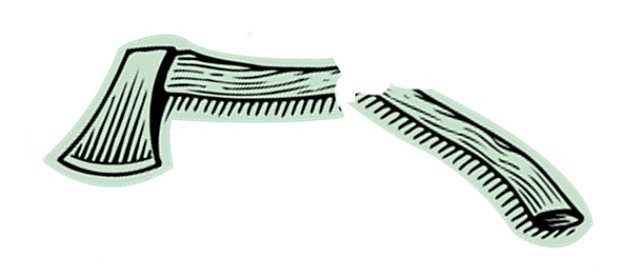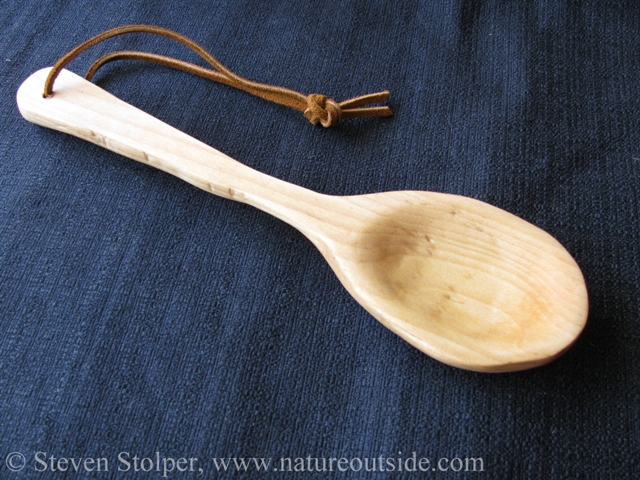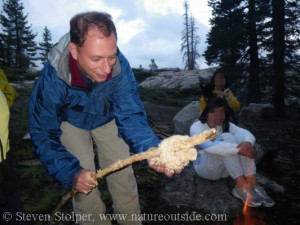
Ray Mears is one of the foremost bushcraft experts in the world, and you’re not.
Neither am I.
Through his numerous television programs Ray takes viewers on wonderful journeys while teaching usable bushcraft skills. The relaxed pace of his shows stand in contrast to the cacophony of “reality television” that bombards us with dizzying images of cliff jumping, urine drinking, and similar gratuitous (and dangerous!) behaviors.
Ray makes it look so easy! An aboriginal craftsman fashions a boomerang from a tree root with a small hatchet. A polite, “Can I do some of that?” and Ray steps in and does a terrific job. A cedar box? A birch bark canoe? No problem. Whether crafting a basket or tracking a leopard he seems to have an encyclopedic knowledge and an endless repertoire of practical skills.
I know that television magic can make anyone seem an expert. He undoubtedly does his research and consults local guides. But Mr. Mears strikes me as an honest man with a genuine mastery of his craft.
Spoon vs. Spoon
But we as humans have a natural tendency to compare ourselves to those we see around us. In the 1950’s this led to a phenomena called, “keeping up with the Joneses.” Today, the media bombards us with images of wealthy, beautiful, and extremely happy (seeming) people. They have become surrogates for our social group and we all suffer by comparison (pun intended).
Bushcraft is not immune from this effect. Let me give an example. In one of Ray’s programs, he splits a log and carves it into a spoon. He makes a thing of beauty with amazing ease. In contrast, I’m successful if I still have my fingers when I’m done.

My first spoon is ungainly, bulging, too thick in some places and too thin in others. At the time, I consigned it to my “Drawer of Bushcraft Mistakes No One Will Ever See.” Now I love it and still use it as a serving spoon to this day
The best way to learn bushcraft is to surround yourself with accomplished people who willingly and graciously share their knowledge. My best information about wild edibles, tracking, and firecraft comes from spending dirt time with people I respect.
But don’t fall into the trap of thinking how little you know compared to others! It is easy to become discouraged, especially when you are starting out.
When I began learning bushcraft, I encountered people with amazing skills. It would take me several lifetimes to amass their knowledge! It was a little depressing to think about how little I knew compared to so many others.
From time to time, I see this same feeling reflected in the eyes of beginners – people new to bushcraft and eager to learn. That’s when I share Ray’s secret with them. And I explain to them how they too can become bushcraft experts.
Ray’s Secret
There is a secret behind the beautiful spoon he carved with such ease:
Behind that spoon are thousands of hours of practice, thousands of books read, hundreds of lectures, countless conversations with experts, and a lifetime geared toward learning.
You may be thinking, “Steve, can’t you say this about any virtuoso performance?”
Yes.
I can’t play the saxophone like Charlie Parker because I don’t put in the practice time, the study, and the performance time he invested in his playing. It is this dedication to craft that always separates the good from the great.
When you see an expert like Ray Mears, you have to keep in mind all the work, study, and dedication that go into that perfect spoon. It is not that he is talented and we are not. His skill reflects a dedication to craft that few of us possess.
But You *Can* be Ray Mears
You may expect me to tell you to put in a thousand hours of practice, like Ray Mears. But I won’t.
It’s unrealistic. After all, for most of us bushcraft is a hobby not a vocation.
Instead, I want you to appreciate what you have to offer.
Yes, you have something unique to offer!
Bushcraft has no formal path of education or training. There are no bushcraft colleges, formal curricula or textbooks. Each of us is the sum of our unique learning experiences. And your learning experience is unique in the entire world! I bet you have bushcraft information that even Ray Mears would love to learn! It may be a small insight about your local area, or a sliver of information gleaned from a knowledgeable neighbor. Remember that you do have valuable expertise to share. Take pride in that and don’t fret about what you don’t know.
I have this little trick. I never compare myself with another to benchmark my bushcraft skill. Instead, I compare myself to where I was 6 months ago. Often I’m startled to see how much I’ve learned and experienced over that time. I suggest you do the same. It is a great tool to inspire personal growth.
You be You and Ray be Ray
We may never have the dexterity and skill of a Ray Mears. But we do have the capacity to become very good at bushcraft skills. Just bear in mind that mastering bushcraft is a continuous learning process. There is no graduation – Even if you are Ray Mears.
Related articles
Ray Mears on Bushcraft (Video)
Bushcraft Knife Safety – 9 Tips to Avoid Accidents
References
Wild Food (DVD), Ray Mears
Extreme Survival, Series 3 (DVD), Ray Mears
For fun facts and useful tips, join the free Bushcraft Newsletter.




I agree totally, regarding the accumulation of experience and knowledge. Over time, it soaks in.
The mistakes, the accidents, the successes, the utter failures. They, all teach us.
I admire Ray Mears greatly. His empathy with nature, appeals to something similar in myself.
Peter, you make a good point about learning from mistakes and failures. As a society we tend to focus on success. But as individuals we don’t improve unless we learn from our mistakes.
I admire Mr. Mears as well for the same reasons!
I liked the article. Ray Mears has a massive amount of knowledge. And an amazing talent as a teacher. If you have watched his shows you will know what I mean. If you haven’t seen them you should have a look.
The ”Bushcraft” society if that’s what you call it…..is becoming quite snotty…and critical of new people getting into it…everyone thinks they are right….and they argue about it. When I am out with new people in the woods…I tell them that there is more than one way to do things…I will show them how I do things….but do what works for you….if you find your way doesn’t work then make a change. We all learn from our mistakes or at least we should. None of us know it all….and we can all learn from each other.
Wade, I like the your attitude toward teaching others! It strikes me as very mature.
I’ve been fortunate never to encounter “snottiness” in the field. Everyone I’ve hiked with has always been eager to share his/her knowledge and patient with my mistakes. Many use the “Coyote Teaching” method that encourages students to find their own way. Part of this method drives me up the wall – students answer their own questions (with guidance). But it never imposes the instructors’ views on the student. If you are curious about the Coyote Method, the best book I’ve found is Jon Young’s, “Coyote’s Guide to Connecting with Nature”.
So my personal experience has been that most of the truly talented bushcrafters are not snotty. 🙂